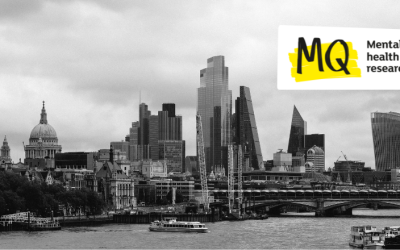No matter your religious beliefs or traditions, all holidays hold some similarities in the joys to be had and the difficulties we may face in many areas, particularly when it comes to mental health.
Whether you celebrate Thanksgiving, Diwali, Christmas, Hannukah, Kwanzaa, Winter Solstice, National Cookie Day (4 December in America but we might adopt this in the MQ office!) or any holiday in the winter months, the upcoming season presents many opportunities to celebrate and also some challenges.
Quite a few of us struggle with our mental well-being during the holiday period. In December 2021, depression and anxiety rose sharply, and life satisfaction dropped compared to November that year.
There are many reasons why the holiday season might be harder than others when managing mental wellness and well-being. First we’ll outline common concerns before solutions.
Common Challenges
Self-care deficit – well-informed self-care can make a positive difference to our mental health. During busy festive periods, routines are easily disrupted. It might feel like emphasis is placed upon caring about and caring for others. It may for some take more effort to carve out time to pause and process due to perceived pressures around us.
Tiredness – fatigue is a complex challenge. At any busy time, our body and mind can become tired. This can exacerbate mental illness and add to stress.
Worry – rumination is a known factor in mental health conditions such as depression and anxiety. Looking ahead to the new year might cause understandable worry about finances, politics, climate change or personal plans and life management. Managing worry can also be complicated when support systems, such as friends or a mental health service, are less available.
Memories - any significant date in a calendar can provoke strong responses. An anniversary of a memorable time can be joyful to recall or it can be retraumatising. Trauma can hit our nervous system powerfully and unexpectedly. For some, mental illness is linked to adverse childhood experiences memories of which may be hard to ignore or avoid.
Comparison – comparison may be the thief of joy, but it is also a symptom of low self-esteem. During the holidays, seeing others doing things differently to you can be intensely isolating. We might be tempted to compare our present reality to an idea of what the holidays ‘should be’. But language can have a strong impact on mental health. Telling ourselves we should do something can be limiting, when telling ourselves we could do something is empowering. ‘Should’ can always be replaced by the word ‘could’.
Limited Support – social support is known to be a positive factor in mental wellness, particularly in recent years when it may have been limited. Mental health services might be harder to access during the holidays and support networks might not be as available. This could feel isolating but with preparation it is manageable.
Pressure – social pressures for tradition and a perceived lack of autonomy of choice can be disempowering. Making our own choices is helpful to mental wellness, and diminished autonomy can exacerbate mental ill health.
Dark days – amidst all the extra strain, the darker days make our experience feel even more intensified. Find out more about why sunlight affects our mental health in our article here.
Struggles we see – during the festive period, you might find yourself more aware of those in society who are struggling with homelessness or loneliness more so than usual. Empathy is an important skill to nurture, however it might be difficult to be empathetic and not feel fatigue of disempowerment. Empathy fatigue is a common problem for mental health professionals and all of us to an extent. This might feel disempowering, understandably adding to a feeling of helplessness which can be detrimental to mental well-being.
What helps?
If you anticipate your mental health might suffer in the coming weeks, consider experimenting with these preventative steps:
Identify triggers – ‘trigger’ Is a phrase often overused, but refers to actions, or stimulations that can lead to an adverse emotional reaction. Understanding the importance of finding ways to identify what triggers are helps us to anticipate and manage them. Sensory experiences, places, people, dates, many other things could provoke traumatic memories or at least anxiety-provoking recollections.
Anticipating stress could hold many benefits in managing stress. Take a look at your calendar over the coming weeks to identify difficult or busy times to come. You could alert yourself, and maybe others, of the extra stress to come. Consider asking for help to stay emotionally regulated or help practically. You might be able to identify other times beforehand you can dedicate to looking after to yourself. Consider journaling about what memories these dates, people or places might bring up for you and arrange time to talk to trusted people about this, whether a therapist or a person close to you.
Prepare non-negotiables – while daily routines might differ from person to person in their benefit to the individual’s mental health, a regular routine and forming habits can help sustain a better quality of life. No one else can dictate what works for you, so note what helps you ahead of time and focus on prioritising these over the holiday period more than usual. Running? Music? Journaling? Baths? Being in nature? Meditation? Drawing? Whatever activity helps you, make that a non-negotiable, no matter how busy things get.
Open up – friends or family can be a source of stress, but others might be a source of support. Some family members might hold views filled with stigma of mental health conditions which can cause difficulty for those trying to recover. However others might be able to hold open supportive conversations. So consider opening up to those you’ll be spending time with. Stigma can be a fear but one it is possible to face. While more people are presenting with mental ill health, this also means more people are accepting of mental health struggles. So ask people you’ll be spending time with over the holidays to read articles or blogs about your condition so they have more information to inform how they support you.
Reach out remotely – Not all of us have the luxury of spending the holidays with people we feel safe or comfortable with. Loneliness and isolation is a real issue during the holiday period and can cause mental health and physical health problems. Likewise for some, being around people we wouldn’t normally choose to spend our time with can also be very stressful.
Talking to people you trust is often better than not talking.
If those you trust will be remote from you during stressful periods, give them a heads up and arrange a virtual chat, phone call or even a virtual gaming session or something similar. Having that time planned in the diary can make the hours or days beforehand more manageable, knowing time to vent or be distracted positively is coming soon.
Break With Tradition – traditions and rituals are held sacred to many people and groups. Breaking with them may feel impossible due to the outrage it could cause and exclusion that might be experienced. This can be harmful to the mental health of some of us.
If you feel able to and that it might free you positively, why not identify traditions that feel troublesome for you or triggering and experiment with doing things differently? Or even imagine doing things differently. Imagining other possibilities might be enough to provide hope. And maybe offer yourself something small that’s new to remind you of your autonomy.
Maybe it’s a different kind of decoration, a new kind of holiday food, eating out rather than cooking, inviting friends as well as family or taking a trip instead of staying home. Or on a micro-scale you might consider wearing an item of clothing or jewellery that reminds you of your sense of self around those you’re spending time with and whose traditions or rituals are not comfortable for you.
Perhaps a new tradition could be holiday volunteering…
Help others – volunteering good for your mental health, it’s widely understood. And during the festive period, charities need help. However if you don’t feel able to volunteer during this part of the year, why not make December the time you sign up to volunteer in January or February? Other times of year are less popular for volunteers to offer their time so your time will be additionally helpful.
Find out more: read 6 tips for looking after your mental health at Christmas here.



